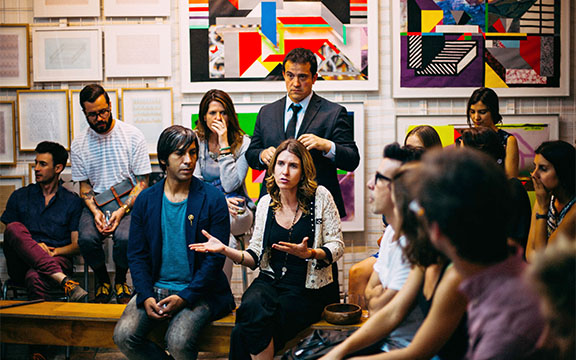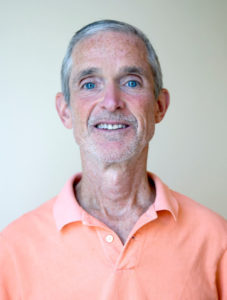
Photo by Antenna on Unsplash
If we pay attention to the world news, I think we can agree that our world is in dire need of more mindfulness, justice, and compassion. On an individual level, a deeply– entrenched sense of separation—and the resulting insecurity—has given rise to so much mistrust and greed that we fail to experience the ground of being that we all share. This dynamic, on the large scale of the world stage, has translated into tremendous suffering and great injustice.
It’s understandable that many feel powerless to bring light into this foreboding darkness that overshadows our world today. Yet the spiritual teachings of many traditions inspire us to engage in the world rather than retreat from it. Many great beings have served as role models for us by taking one step at a time, with compassion and mindfulness, guided by the deeper understanding of our interdependence.
Some of our Integral Yoga Institute of San Francisco community members have decided to focus our energies in this direction as one way to practice compassionate communication. Communicating with genuine care for the well-being of another person is both practical and immediately applicable to our daily lives. We were inspired by a recent satsang offered by Reverend Kamala Itzel Hayward, who offered a number of concrete steps that we feel can open the doors to deep listening, and problem-solving with open hearts. Here are a few of the principles that we are practicing, some of which come directly from Marshall Rosenberg‘s teachings on Nonviolent Communication.
First, observe the tendency to interpret the facts, which can easily give rise to judgment, anger, or irrational conclusions. For example, we may find ourselves concluding that someone dislikes us when they give us critical feedback. In reality, such remarks may be a way of showing care and a genuine desire for us to grow. Instead of jumping to conclusions, a much better approach is to separate the actual facts from the assumptions we might make based on our past experience.
One thing to be aware of: the mind loves to create stories. The multi-billion dollar per year entertainment industry certainly supports what Yoga science has long known. If you really are unsure what someone’s motives might be, and you feel they would be open to speaking with you about your concerns, you could try the following:
- Ask the person if they would have time to talk to you.
- If they agree, you could frame your concerns in the following way: “I hope you can help me navigate an issue that’s arisen. I find that I’m telling myself the following story.” Then, proceed to describe what that story is in as neutral a way as possible adding, “And, before I jump to any conclusions I was hoping you could share your perspective with me about what I just shared.” This leaves the door open to hearing a different perspective or having your interpretation of events verified.
Secondly, when we disagree with someone, there can be a great benefit to reflecting on the needs that this person has. Instead of just focusing on their outward actions, it might make a considerable difference to be curious about the needs behind their point of view. One immediate benefit is that if we show genuine interest in their needs, we may quickly defuse a charged conversation with our intention to understand them in a deeper way. Then, if they can feel we are communicating with compassion in our hearts, they might also open their minds to hearing about our needs and perspectives.
Rev. Kamala told us about a friend of hers who had a potentially charged argument with someone who was in support of building a wall at the US-Mexican border. When Kamala‘s friend asked with compassion and curiosity about the need that this person had behind their support of the wall, the conversation shifted and the two found common ground in the basic need of wanting to protect their families. Once we can understand the need behind someone’s assertions, we are capable of relating to them from the heart instead of simply judging their point of view as wrong. We may be able to dialogue instead about alternative ways to fulfill that need instead of simply deciding they are wrong.
Thirdly, if we approach a disagreement with someone dead set on changing them or showing them where they are wrong, we are unlikely to succeed. Whereas if we can show a genuine concern and respect for their perspective, our dialogue is much more likely to find common ground.
It might sound much simpler and safer to simply avoid conflict and difficult conversations. But doing so may also mean compromising our commitment to practicing ahimsa (non-violence) and satya (truthfulness), as well as the intention to stand up for social justice.
Bringing compassion into a dialogue over polarized points of view has proven to be very powerful, especially when we look at the non-violent activism of Mahatma Gandhi, Martin Luther King Jr., and Thich Nhat Hanh. Every one of us can make an effort to embark upon a pathway of mindful and open communication rather than judging someone’s point of view without understanding what’s behind it.
Rev. Kamala’s friend, Kathy Simons, suggests approaching potentially charged conversations by saying something like, “I think about this a little differently than you. I’d like to hear more about what you’re thinking and if you’re open to it, tell you more about my perspective.” Along with this kind of effort, it’s equally important that we have compassion for ourselves and discern when we are ready to engage in a difficult conversation or when we may be too upset to speak skillfully.
Each aspect of compassionate communication is supported and enhanced by a regular meditative practice that brings clarity and equanimity to the mind. A committed practice will gradually enable us to disengage from the ways our minds construct stories, leading us to define ourselves as separate, thus clinging to narrow perspectives. As we quiet the habitual thoughts that cloud our vision, we can experience a quiet Presence at the core of our being. As our understanding expands, we begin to experience the spiritual truth that each of us has that same essence-nature. Then, a natural flow of compassion for ourselves and each other can fully blossom.
About the Author:
 Swami Ramananda is the president of the Integral Yoga Institute of San Francisco and a greatly respected master teacher in the Integral Yoga tradition, who has been practicing Yoga for more than 35 years. He offers practical methods for integrating the timeless teachings and practices of Yoga into daily life. He leads beginner, intermediate, and advanced-level Yoga Teacher Training programs in San Francisco and a variety of programs in many locations in the United States, Europe, and South America. Swami Ramananda trains Yoga teachers to carry Yoga into corporate, hospital, and medical settings and has taught mind/body wellness programs in many places. He is a founding board member of the Yoga Alliance, a national registry that supports and promotes Yoga teachers as professionals.
Swami Ramananda is the president of the Integral Yoga Institute of San Francisco and a greatly respected master teacher in the Integral Yoga tradition, who has been practicing Yoga for more than 35 years. He offers practical methods for integrating the timeless teachings and practices of Yoga into daily life. He leads beginner, intermediate, and advanced-level Yoga Teacher Training programs in San Francisco and a variety of programs in many locations in the United States, Europe, and South America. Swami Ramananda trains Yoga teachers to carry Yoga into corporate, hospital, and medical settings and has taught mind/body wellness programs in many places. He is a founding board member of the Yoga Alliance, a national registry that supports and promotes Yoga teachers as professionals.

